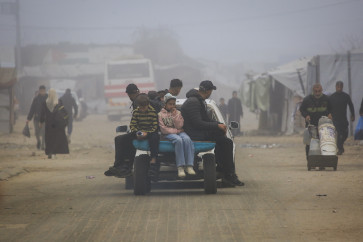Popular Reads
Top Results
Can't find what you're looking for?
View all search resultsPopular Reads
Top Results
Can't find what you're looking for?
View all search resultsOcean energy generation facilities for Indonesia ' can we have them?
The generation of electricity is the conversion of energy from one form to another through a combination of chemical and/or mechanical means
Change text size
Gift Premium Articles
to Anyone
T
he generation of electricity is the conversion of energy from one form to another through a combination of chemical and/or mechanical means. In the case of hydroelectric generators, the concept involves the conversion of hydrostatic energy to kinetic energy and then to electrical energy. The concept is not new ' many successful projects have been completed over the last 75 years to successfully harness the energy of the oceans and convert it into electrical energy.
Renewable energy is now truly in the global market and continuous innovation in power-generation technologies and supporting infrastructure is driving cost-reduction efficiencies and generating significant investment opportunities across developed and emerging markets. Planet Earth's oceanic resources are vast and real progress has been made by many governments toward a better understanding and commercialization of this valuable renewable energy resource.
Several turbine equipment investments by major manufacturers such as Siemens, Rolls Royce and others (Siemens is building two new turbine factories in the UK) are recognized as major steps forward for the industry. Commercial tidal-array power generators in the UK are fast-growing developments. These high-output underwater turbines have been available for five years or more.
Fuller understanding of government licensing has helped developers to accelerate their projects. Policy challenges continue to be addressed in a number of countries that look to the UK, France, Canada and the US for guidance, where long-term policies and robust FiT (Feed-in Tariff) rate support for the tidal energy industry continues.
Many countries have now embraced ocean energy as a viable route to reducing dependency on fossil fuels, strengthening their nation's energy security and in meeting their low-carbon environmental obligation targets.
Where ocean energy resources are available, these can significantly help countries to meet their green objectives.
Indonesia's heavy reliance on fossil fuels for power generation (and associated subsidies), alongside its growing population demands, has resulted in its openness to explore, embrace and support renewable energy sources.
The almost 17,500 islands that form Indonesia's archipelago constrict both tidal and non-tidal ocean currents as these forces encounter the landmasses. This fact alone indicates there are areas where ocean energy resources can be harnessed in accordance with President Joko 'Jokowi' Widodo's vision for Indonesia as a global 'maritime axis' for the benefit of the nation's economy and its remote-location populations where the government is subsidizing diesel fueled generators.
A recent study of the feasibility of tidal energy for Indonesia determined the types of tidal developments that are most appropriate and suitable for Indonesia from a resource, practical and technical perspective.
Studies completed earlier this year established that the best commercial case for the first developments is to install tidal turbine arrays, sized between 20 and 60 megawatts.
Detailed research, reviews and findings carried out since last year have confirmed 11 areas around the archipelago where ocean resources, water depth and proximity to populations merit more detailed investigation. From these areas, three locations have been selected for further focused assessment.
Interestingly, a greater tidal resource exists than had been identified by wide-area ocean resource study and these data are currently being subjected to further analysis to determine whether they will improve initial findings.
In order to develop scenarios that can be used to build economic cases and assess risk, it is necessary to establish methodology and an understanding of the basic requirements, namely to determine the extent that adequate ocean resources are available for Indonesia, the readiness of suitable technology, the availability and suitability of the selected sites and the practical constraints, such as water depth and proximity to population centers.
From experience in the marine and subsea sectors it is known that government approvals and consenting processes can have a negative impact on project development time. Therefore, this needed to be studied to better understand the potential constraints that this activity might introduce on the ocean energy developments and a logical process followed to inform the development of the potentially available scenarios. Previous studies, papers and other literature related to tidal-stream devices and ocean energy resources were reviewed, as well as the low-carbon sector generally in Indonesia.
These data were then used to better understand the constraints, the development opportunities and, in some cases, to support the findings of initial studies and assessments. A resource and practical constraints assessment was then performed, modeling the available ocean resource to identify 'hot spots' of interest, using global information system (GIS) to overlay the water depths and resource proximity to population centers that should benefit from ocean energy generation developments.
A technology assessment was then performed to produce a shortlist of approved turbine manufacturers and to summarize the various ancillary technologies, such as power-transmission cables, electrical connectors, turbine support structures, onshore power transmission and distribution substations and so on.
Can Indonesia have ocean energy power generation? Yes it can.
Michael J. Spencer is group chairman and CEO of SBS and Stephen Spall is a global metocean specialist.










